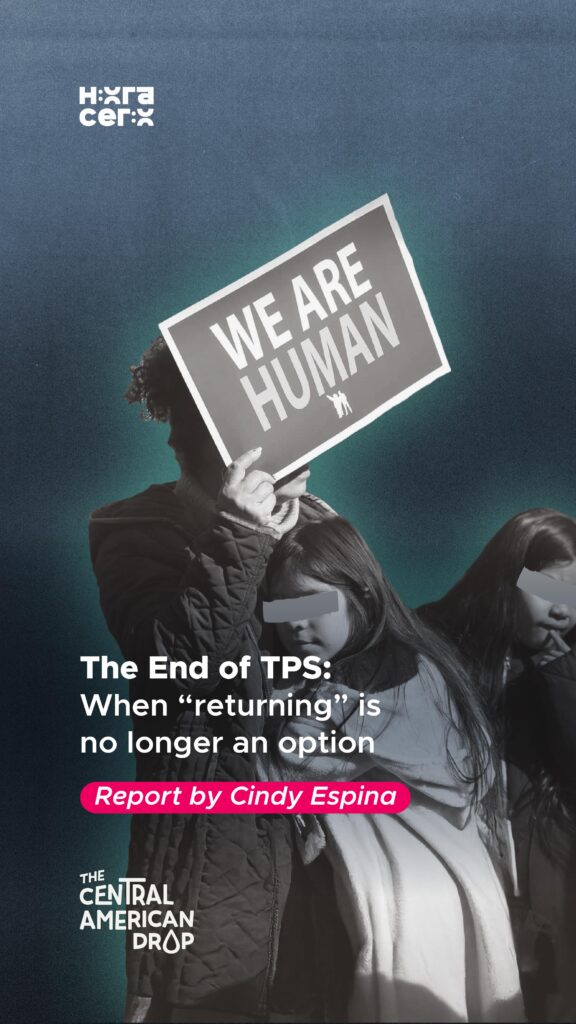
For 26 years, Nicaraguans and Hondurans with Temporary Protected Status (TPS) have lived in limbo. Every 18 months since January 1999, different US presidents have extended the validity of this humanitarian permit to reside with work permits in the United States, but on July 5, 2025, this no longer the case, as President Donald Trump ended TPS for 80,000 Central Americans who have built a life, a family, and a community in the US.
TPS is a residence and work permit granted by the United States government to people from countries experiencing armed conflict and disasters caused by climate-related or natural events. This is why people from Honduras and Nicaragua had TPS, because in October 1998 the Hurricane Mitch flooded and caused damage, mainly in these two countries, which endangered the lives of hundreds of thousands of people and worsened people’s living conditions.
Teófilo Martínez, a 57-year-old Honduran and member of the National TPS Alliance, an organization that brings together hundreds of people from the 17 countries that until now had TPS, says that the word “return” is not part of the vocabulary of the “TPSianos», as he calls people who have this permit.

For Teófilo, to return to Honduras is unthinkable because, due to his age, he believes no one would hire him. He doesn’t believe Honduras is the best country to invest in a business due to the insecurity affecting the Central American country. But beyond the economic aspect, he believes the true reason behind his decision lies in his family, friends, and community. He has lived in the United States for 27 years, has a family, a professional career, and a real estate business that he was able to build thanks to the TPS and from his home in Atlanta, Georgia. This is why the activist and businessman assures that he will not give up the life that has cost him so much to build.
“We pay taxes, we pay a retirement pension and every time we have renewed the TPS we pay for that permit, in addition we submit to an evaluation in which they verify whether or not we have committed a criminal act to give us the permit again… we deserve to be permanent residents of this country,” explains Teófilo from his small office in Georgia, in which he has placed a banner that reads: National TPS Alliance and from there he attends meetings and broadcasts his YouTube program called: TPSian Fight.
Martinez is part of a group of people who filed a lawsuit against the recent decision of the US president, but this defense and fight The «TPSians» has been a constant effort in their organization. They have manifested several times in Washington, D.C., demanding permanent residency, and this would be the second time they have faced Trump in U.S. courts to defend their right to remain in the United States.
“We already defended it (TPS) in the first term (of Trump), we are going to defend it now,” adds Teófilo and asserts that these legal actions buy them time, because otherwise they will only have 60 days to settle everything and leave the United States. “But no one has the right to break up families,” he says, and that is why his organization continues its resistance.
The National TPS Alliance was founded in 2017, after Trump announced and executed the order to end TPS for people from Nicaragua, Honduras, El Salvador, and other countries. On that occasion, the US president’s decision faced numerous lawsuits, including one from members of the National TPS Alliance. At that time, the various organizations defeated Donald Trump, but currently, the US government has followed other strategies in which they are more careful with the established timeframes for ending this type of protection, since in the past, this has been the reason why judges have ruled against them. So far this year, the president of the US has also withdrawn TPS from Haitians, Afghans, Venezuelans, and Cameroonians. In the case of Haiti and Venezuela, the ruling is still pending until September due to the actions brought by National TPS Alliance.
“Many people say: you can spend twenty-something years living in the US and still you are not able to settle your papers,” but the thing is that in the United States one doesn’t say: ‘I don’t want to settle papers’, it’s the laws themselves – which are very strict – that don’t allow it,” says Teófilo to explain why he is struggling and worried, because once his TPS expires, he will not be able to renew it and he needs it, because through this document, he can have a driver’s license, important documents for his business, and the guarantee of continuing his life in the United States without fear of being deported to Honduras.
Internationalist and migration specialist Lady Junek Varga, whose doctoral thesis at UNAM focuses on migrant population management and regulation policies, explains that TPS are provisional immigration management strategies and that force people to live in constant uncertainty because it is a permit that can be revoked by decree. «Ultimately, it’s a way to regulate residence in the United States and grant work permits without any right to citizenship or permanent status,» adds Lady Junek.
According to the immigration specialist, some Nicaraguan and Honduran TPS holders still have valid TPS permits, despite Trump’s announcement, because their documents may expire in the coming months. The problem is that they won’t be able to renew them, putting them at risk of deportation.
Teófilo Martinez indicated that they have no report that a person from Honduras and Nicaragua with TPS has been detained for deportation; however, the network of the National TPS Alliance is aware that this may be a possibility and is ready to activate any support to people who require it.
The story of Teófilo is just one of 80 thousand stories of Hondurans and Nicaraguans who starting on September 8th they will not be able to renew their TPS after more than two decades of living in the United States. They won’t be able to access permanent residency and face the threat of being deported against their will or being subjected to the prison detention system that the U.S. government implements against the Latino immigrant population.

| Cookie | Duración | Descripción |
|---|---|---|
| cookielawinfo-checkbox-analytics | 11 months | This cookie is set by GDPR Cookie Consent plugin. The cookie is used to store the user consent for the cookies in the category "Analytics". |
| cookielawinfo-checkbox-functional | 11 months | The cookie is set by GDPR cookie consent to record the user consent for the cookies in the category "Functional". |
| cookielawinfo-checkbox-necessary | 11 months | This cookie is set by GDPR Cookie Consent plugin. The cookies is used to store the user consent for the cookies in the category "Necessary". |
| cookielawinfo-checkbox-others | 11 months | This cookie is set by GDPR Cookie Consent plugin. The cookie is used to store the user consent for the cookies in the category "Other. |
| cookielawinfo-checkbox-performance | 11 months | This cookie is set by GDPR Cookie Consent plugin. The cookie is used to store the user consent for the cookies in the category "Performance". |
| viewed_cookie_policy | 11 months | The cookie is set by the GDPR Cookie Consent plugin and is used to store whether or not user has consented to the use of cookies. It does not store any personal data. |